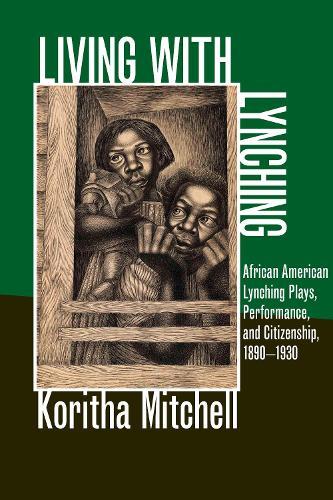Awards
- Winner of <DIV>Winner of the American Theatre and Drama Society (ATDS) Book Award, 2012. Winner of the Society for the Study of American Women Writers (SSAWW) B 2012
- Winner of <DIV>Winner of the American Theatre and Drama Society (ATDS) Book Award, 2012. Winner of the Society for the Study of American Women Writers (SSAWW) Book Award, 2012.</DIV> 2012
Overview
Living with Lynching: African American Lynching Plays, Performance, and Citizenship, 1890–1930 demonstrates that popular lynching plays were mechanisms through which African American communities survived actual and photographic mob violence. Often available in periodicals, lynching plays were read aloud or acted out by black church members, schoolchildren, and families. Koritha Mitchell shows that African Americans performed and read the scripts in community settings to certify to each other that lynching victims were not the isolated brutes that dominant discourses made them out to be. Instead, the play scripts often described victims as honorable heads of households being torn from model domestic units by white violence. In closely analyzing the political and spiritual uses of black theatre during the Progressive Era, Mitchell demonstrates that audiences were shown affective ties in black families, a subject often erased in mainstream images of African Americans. Examining lynching plays as archival texts that embody and reflect broad networks of sociocultural activism and exchange in the lives of black Americans, Mitchell finds that audiences were rehearsing and improvising new ways of enduring in the face of widespread racial terrorism. Images of the black soldier, lawyer, mother, and wife helped readers assure each other that they were upstanding individuals who deserved the right to participate in national culture and politics. These powerful community coping efforts helped African Americans band together and withstand the nation's rejection of them as viable citizens. The Left of Black interview with author Koritha Mitchell begins at 14:00. An interview with Koritha Mitchell at The Ohio Channel.
Full Product Details
Author: Koritha Mitchell
Publisher: University of Illinois Press
Imprint: University of Illinois Press
Dimensions:
Width: 15.20cm
, Height: 2.30cm
, Length: 22.90cm
Weight: 0.426kg
ISBN: 9780252078804
ISBN 10: 0252078802
Pages: 272
Publication Date: 06 July 2012
Audience:
College/higher education
,
Postgraduate, Research & Scholarly
Format: Paperback
Publisher's Status: Active
Availability: Out of stock

The supplier is temporarily out of stock of this item. It will be ordered for you on backorder and shipped when it becomes available.
Reviews
[Mitchell] shows how performing lynching plays in community spaces allowed African Americans to actualize the various subjectivities ... that lynchings sought to expunge. This book is required reading for understanding the ways in which narrative and performance have been central to challenging white oppression as well as (re)imagining black identity in America. Highly recommended. --Choice An emphatic push to change how we understand, write about, and teach the phenomenon of lynching. --H-SHGAPE Mitchell methodically documents and skillfully interprets lynching drama's important cultural work... She illuminates an overlooked aspect African American literary history. --Arkansas Review Impressively researched and powerfully argued, this first full-length critical study of lynching drama shows the ways that these plays galvanized dynamic conversations about the racialized politics of privacy, citizenship, patriotism, and gender roles in American culture. Living with Lynching is a tremendously illuminating work that breaks new ground in theatre and performance studies, African American literary history, and women's and gender studies. Daphne A. Brooks, author of Bodies in Dissent: Spectacular Performances of Race and Freedom, 1850-1910 This vivid book makes a major contribution to the literature on lynching in the U.S. by excavating an under-examined archive of black dramatic responses to it. Offering a new and convincing periodization of lynching drama, Mitchell moves beyond the best known texts to illuminate a range of plays diligently retrieved and scrupulously interpreted. Living with Lynching is a testament to the endurance of black life in the face of social death. Tavia Nyong'o, author of The Amalgamation Waltz: Race, Performance, and the Ruses of Memory
<p> <p> <p><p> An emphatic push to change how we understand, write about, and teach the phenomenon of lynching. -- H-SHGAPE <p>
Author Information
Koritha Mitchell is an associate professor of English at The Ohio State University.



